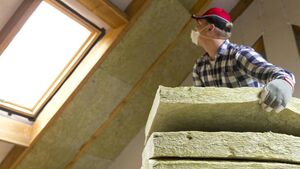SEAI urged to reconsider upfront cost of upgrading homes

Improving attic insulation is a typical staged project for improving the BER on your home. The SEAI is being urged to reconsider the upfront costs for people interested in upgrading their homes. Pic: iStock
The Sustainable Energy Authority of Ireland (SEAI) is being urged to reconsider the upfront costs for people interested in upgrading their homes.
Speaking at a recent plenary meeting of Roscommon County Council, Independent councillor Laurence Fallon said the SEAI was “putting a lot of money” into the area of upgrading houses but believed it was really only those “in the better off category” who could draw down the funding.
“The cost of retrofitting a house is in the region of €60,000 to €70,000 to get it to a proper standard and a lot of families don’t have that sort of money. When they see €70,000 upfront having to be paid, it’s a no,” said Cllr Fallon.
The latest figures show that 941 homes in the county received home energy upgrades via the Sustainable Energy Authority of Ireland (SEAI) in 2024, this was a slight decrease on the 2023 figure of 965.
Since 2019 a total of 3,117 homes in the county have availed of retrofit schemes, according to the SEAI 2024 Full Year Retrofit Report.
The report shows that as of the end of 2024, the Government had invested €1.2 billion in energy upgrades across 186,000 homes and 156 community energy projects, with one third of the expenditure in 2024.
Despite the figures, Cllr Fallon believed that “with a little bit of imagination” the SEAI could reconsider the upfront cost on a phased basis whereby people could spend €20,000 and get a grant and then could spend another €20,000 and get a grant “and the rest of it could be held until the job is complete,” he said.
Cllr Fallon believed there wasn’t a lot of consideration given to the ability of the individual to help this “national cause. Without buy-in from private homes and car owners, our contribution is going to be less impactful than it might be,” he said.
The Independent councillor said he knew many people who wanted to upgrade their homes and proposed that elected members write to the SEAI asking it to reconsider the upfront cost by splitting the grant on a phased basis.
The proposal was seconded by Fianna Fáil councillor Marty McDermott.
Fianna Fáil councillor Sean Moylan agreed saying the upfront cost was the “big blocker” for people interested in home upgrades.
Independent councillor Tom Crosby agreed that the upfront cost for people on lower incomes could prove “prohibitive” and suggested the SEAI criteria needed to be reviewed.
Independent councillor Valerie Byrne agreed that access to SEAI grants needed to be made easier for people.
The discussion arose following a presentation on the county’s climate action plan by Aoife Moore, the council’s climate co-ordinator. The presentation outlined the first progress report on the climate action plan, which was previously adopted by councillors.
Other councillors also contributed to the discussion that followed the presentation.
Fine Gael councillor Liam Callaghan said there was a lot of people willing to replace their septic tanks but it involved a lot of paperwork and bureaucracy. He also raised concerns about the construction of new homes without chimneys and stressed that chimneys on houses in rural areas should be considered.
“If we look back at Storm Éowyn, some people had to leave their beautiful new homes because they had no heat. We didn’t have a backup to electricity and the same applies for people considering buying electric cars,” he said.
Cllr Callaghan said the capacity wasn’t there to look after people in rural Ireland in a crisis situation.
While he said everyone was committed to climate measures, there had to be “a bit of flexibility” so people can live with “ease of mind”. He also posed the question whether the water and sewerage infrastructure was there to meet the housing targets set down by Government.
While pointing out that he drives an electric vehicle and would not go back to diesel, Cllr Crosby said there was a lack of charging points around the country.
Fine Gael councillor Valerie Duffy raised several issues, including whether there were plans for a generator scheme to support communities in the event of future outages.
Cllr Duffy also wanted to recognise the role of Just Transition and how valuable it had been to communities and wondered would there be more funding to deliver this climate action plan for Roscommon.
Fianna Fáil councillor Paschal Fitzmaurice said that from a farming and rural perspective, the farming community had done quite a lot to improve air quality.
He said unfortunately a lot of the carbon emitted by the population is measured by the square kilometre rather where the food is consumed. “I believe that’s flawed. I spoke to the former Minister for Agriculture about this and he agreed with me,” he said.
Cllr Fitzmaurice said that the development of a solar farm in Castlerea was very positive and proposed that through a grant-assisted ‘NeighbourWood Scheme’, the council should develop 14 acres of low-lying land near the town into a woodland amenity for local people. The proposal was seconded by Fine Gael councillor Ruth Connolly Conboy.
The Castlerea councillor also spoke about how 150 apple trees were planted in Foley Bennett’s Orchard to promote biodiversity. He explained that the local Foróige club and CES scheme came on board to help clean up what was previously an old orchard and plant trees there.
During his contribution, he said that they needed to raise awareness about cars idling in towns and the amount of fumes that can come off the one car.
Replying to some of the queries raised, director of services Caitlín Conneely said that septic grant numbers in the county had increased from 5,000 to 12,000 but acknowledged there was still an issue with the scheme.
In relation to whether there was sufficient water and wastewater infrastructure to meet housing demands, she said that the council would continue to work with Uisce Eireann through the County Development Plan in that regard.
Ms Conneely also pointed out that a strategy for charging points in the county would be discussed at council level.
Cllr Fitzmaurice pointed out that there “was talk” about a proposed scheme to make a generator available for use for a number of community hubs.





